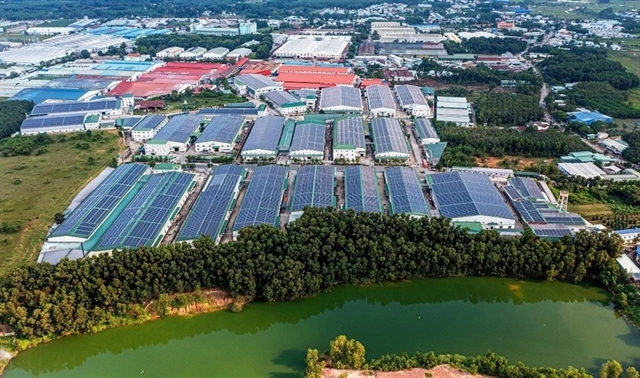Green industrial zones key to sustainable development, investment attraction
Experts said that next-generation industrial zones must cover three layers of services: smart infrastructure (such as IoT and 5G), supportive business ecosystems and multi-functional utilities including R&D centres and worker housing.

HÀ NỘI — At the forum 'Promoting the development of industrial zones: Comprehensive solutions and sustainable investment' held on Thursday in Hà Nội by the Vietnam Industrial Real Estate Association, delegates agreed that the development of green industrial zones is crucial to attracting investment and boosting Việt Nam’s economic growth.
As part of implementing the National Green Growth Strategy, Việt Nam is gradually shifting towards a more sustainable development model. In this context, policies supporting the development of eco-industrial zones and circular economy strategies are drawing growing interest from domestic and foreign investors.
Bạch Ngọc Tùng from ACUD Vietnam Construction Technology JSC said traditional industrial zones are transforming into a new generation of industrial parks.
He identified three major trends driving this shift: digital transformation, with the adoption of technologies such as Internet of Things (IoT), AI and big data to optimise operations, manage resources and enhance efficiency; sustainable and green development, focusing on resource efficiency, circular economy practices and minimising environmental impacts, with eco-industrial parks as a model; and multi-functional integration, with new industrial zones closely linked to urban and service areas aiming to become smart industrial cities rather than isolated manufacturing hubs.
CEO of Avison Young Vietnam David Jackson noted that next-generation industrial zones must cover three layers of services: smart infrastructure (such as IoT and 5G), supportive business ecosystems and multi-functional utilities including R&D centres and worker housing.
Other participants said Việt Nam is well positioned to develop smart industrial zones, thanks to three key advantages: a strategic geographical location, strong policy momentum and significantly improved infrastructure and human resources.
In terms of policy, the Government aims for 30 per cent of industrial zones to achieve LEED or equivalent green certification by 2030. This goal presents opportunities for developing projects that use recycled materials, rooftop solar energy and closed-loop wastewater treatment systems.
Earlier this year, the Government approved 14 new industrial zone projects across the country, including developments in Cần Thơ, Hải Phòng, Thái Nguyên, Bình Phước, Bắc Giang, Hải Dương and Bà Rịa–Vũng Tàu. Together, these projects span over 4,000 hectares and involve investment worth tens of trillions of đồng. Some zones are oriented towards high-tech, sustainable development models aligned with green industrial trends.
The approval of new projects expands industrial land and creates conditions to attract domestic and foreign capital. These developments are expected to promote local economic growth, generate employment and improve infrastructure systems. Additionally, Việt Nam’s strategic location, competitive operational costs and favourable investment policies are making it an emerging hotspot in the Southeast Asian data centre race.
Nguyễn Văn Tiến, deputy chairman of the Vietnam Industrial Real Estate Association, stated that smart industrial zones in Việt Nam are drawing investment in high-value, environmentally friendly sectors that integrate digital technologies. These include electronics, semiconductors and precision components, electric vehicles and energy storage, and renewable energy and circular technologies.
This shift opens up significant opportunities for Vietnamese industrial zones to better meet the evolving needs of international investors and integrate more deeply into global supply chains.
However, to unlock this potential, Tiến emphasised the need for strong coordination and determination from all stakeholders. He cited Prime Minister Phạm Minh Chính’s directive as a guiding principle: “Do not say no, do not say it is difficult, do not say yes but then not act." VNS





